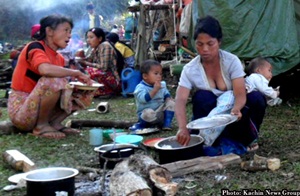Three weeks after Ban Ki-moon's special envoy to Burma, Vijay Nambiar, claimed he had reached an agreement with Burmese authorities to allow the United Nations to deliver aid to the more than 50,000 internally displaced people (IDPs) sheltering in territory controlled by the Kachin Independence Organization (KIO), the UN has admitted that it is still negotiating to allow a new aid convoy.

Last December 12, a four person UN team was allowed to accompany a small convoy which delivered aid to refugee camps located at the KIO's Laiza headquarters.
In a statement issued on Tuesday by the UN spokesperson's office the UN claimed that “Immediately after the December mission, the UN renewed efforts to speed up the dispatch of independent convoys to all areas where IDPs are located, without conditions attached.”
The statement continued “The UN is currently discussing with both sides the modality for a sustained operation to provide IDPs with adequate supplies to address humanitarian needs across all affected areas.”
The statement which is posted in its entirety below stands in sharp contrast to comments made by Nambiar during a February 24 press conference in New York. Responding to a question asked Inner City Press reporter Matthew Russell Lee, Nambiar claimed that during his February 13 to 17 visit to Burma the UN had concluded an agreement with Burmese government officials that would allow more aid shipments to KIO territory.
“There was certain difficulties posed by the government's insistence that government supplies should also be accompanied,” Nambiar said.
The UN Secretary General Ban Ki-moon's former chief of staff added “We continued talks with them and eventually they were able to relent to the extent that they said they would take both the both UN as well as government assistance up to the border. And if of course the rebels insisted that they would not receive the government assistance, they would hold back the government assistance and let the UN supplies convoy go through.”
In addition to bringing supplies from a variety of UN agencies the December UN convoy to Liaza brought aid donated by Burma's central government.
While allowing the UN aid to be distributed to the refugees, KIO officials asked the UN to take back the supplies donated by Naypyidaw saying they feared it was a propaganda ploy on the part of the government.
UN officials in Rangoon have claimed during subsequent meetings with international aid groups that the Thein Sein government won't allow further aid shipments to take place because they were insulted when the KIO refused to allow the government aid to be distributed back in December.
This is a bit of a Catch-22 because according to sources familiar with the aid shipment, the UN was only allowed to visit refugee camps in Laiza in December on the condition that it brings government aid.
More than four months after the December visit refugees are still waiting for the UN to make a follow up visit. According to volunteers who have repeatedly visited the camps over the past nine months, the health situation of many of the refugees has deteriorated since the UN visit in December.
Refugee advocates fear that many of the crowded temporary camps will face a serious health crisis from water borne disease like cholera once the rainy season comes in May.
UN Statement from March 13, 2011 about Kachin Aid Convoy
We have pressed upon our interlocutors in Myanmar to allow greater access to the UN family and partners to provide humanitarian assistance to the displaced population.
In December 2011, a UN mission travelled to previously inaccessible IDPs in some of the areas in areas beyond government control and managed to distribute an initial consignment of household relief items. Immediately after the December mission, the UN renewed efforts to speed up the dispatch of independent convoys to all areas where IDPs are located, without conditions attached.
The UN is currently discussing with both sides the modality for a sustained operation to provide IDPs with adequate supplies to address humanitarian needs across all affected areas.
It is important that all parties involved facilitate such operations, which has a pure humanitarian value and is to be carried out in accordance with humanitarian principles.
During his visit, Mr. Nambiar raised the issue in various meetings with Government and Parliament interlocutors who have indicated that the Government would be favorable to the UN and humanitarian partners to provide assistance to all IDPs. The Kachin Independence Organization (KIO) has also accepted the offer of support of the UN in this regard.
The UN and partners are now working on the modality for continuous support.



